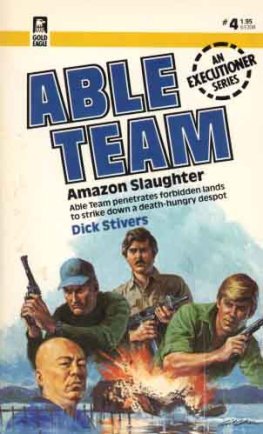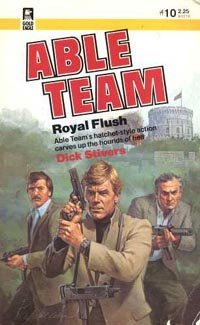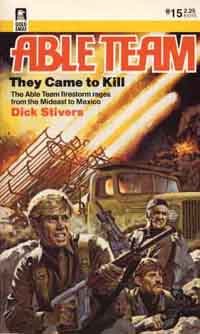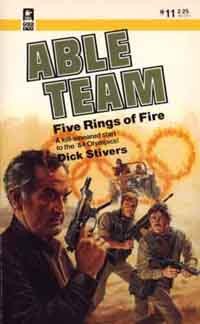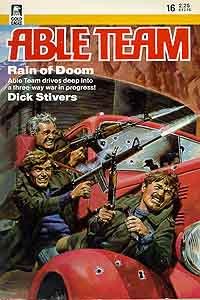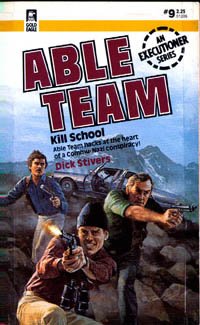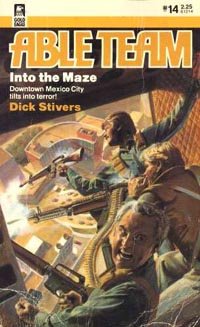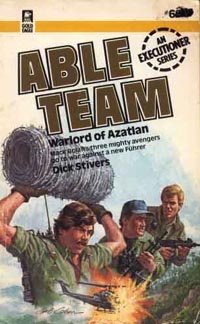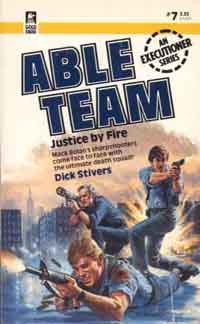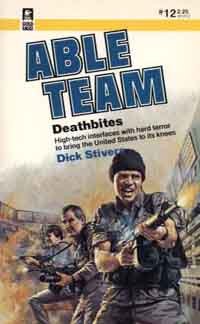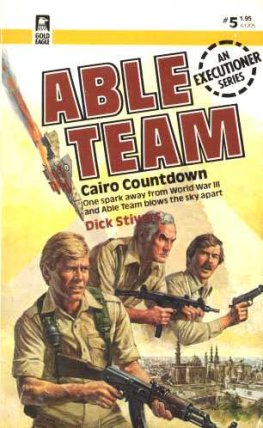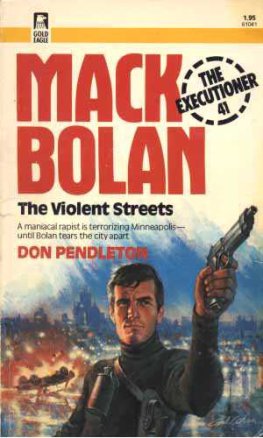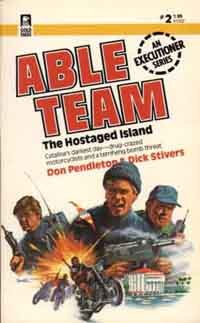Dick Stivers
Amazon Slaughter
Screams came from the radio, then only electronic hiss.
"Stop! Stop the truck!" Abbott shouted, his gaunt, heroin-ravaged face twisted with panic. He switched frequencies on his hand radio, praying for an answer from the control room. Then he realized the truck had not slowed. Like a scene from a nightmare, the truck continued forward. Only a hundred yards separated him from the atomic reactor complex.
"Stop!" Abbott shouted again, grabbing for the steering wheel. The squat, jowly driver stared at him, uncomprehendingly. Abbott repeated the command in Portuguese. The driver hit the brakes.
Dust swirled around the Renault military truck. In front of them, at the end of the dirt-and-gravel corridor cut through the jungle, the gray hemisphere of the reactor's containment vessel rose from the raw red earth. The gray rectangles of the other buildings clustered around the dome. Soaring mahogany and mapacu and rubber trees overhung the area, branches and shadows camouflaging the reactor complex from airborne observation.
Staring at the reactor dome, Abbott felt sweat flow down his body. The radio hissed with static. Abbott knew what the screams meant, and the electronic hiss. But he still watched the dome, hoping to hell that the concrete could contain the atomic and chemical horror that raged inside.
"Mr. Abbott." A voice startled him. He turned, saw one of the work-gang overseers approaching the truck. The overseer wore a pith helmet and olive drab green shorts. His bronzed torso and legs streamed sweat. He crossed his hands over the shotgun hanging by its sling from his shoulder.
"I need a truck to get those Indians back to the compound." The overseer stepped up on the Renault's bumper. He glanced to the reactor buildings. "I buzzed the Unit for a truck, but my walkie-talkie isn't working right."
The Renault lurched, rocked on its springs. Dense white smoke billowed from the complex. The earth shuddered mightily as the reinforced concrete walls of the turbine building collapsed outward, jagged sections twisting as they fell. Clouds of white smoke churned into the sky. Then the scene shimmered as waves of heat poured from the gaping holes. The jungle trees overhanging the reactor complex burst into flames.
"Get us out of here!" Abbott heard himself shouting in English and Portuguese and Spanish, as he watched the nuclear catastrophe.
Grinding the gears, the driver threw the transmission into reverse, sped backward. The overseer clung to the side mirror as the truck bounced. The truck swerved into a wide backward turn.
An Indian screamed as he died under the wheels. The other Indians dropped their shovels and ran as fast as their ankle chains allowed. The truck driver did not pause as he threw the truck into first gear and accelerated.
Abbott shouted into the hand radio, "Explosion at Unit One! Evacuate all work areas. Get our people into the shelters. Issue the oxygen and the anticontamination suits. Turn on the sirens right now and get..."
"Shut up!" a command blared from the radio. "What's going on there? We only see some smoke..."
"You idiot! That's radioactive sodium hydroxide. That's gaseous lye. Anybody who breathes that dies! Anyone it touches is contaminated."
"Is that Mr. Abbott?" the voice asked.
"Yes, this is Abbott. Unit One's exploding. The core could go any second. That's plutonium! You understand? Plutonium!"
"Yes, sir. Doing it right away. The alarms..."
Switching off his hand radio, Abbott leaned from the truck's window to look back. Swirling red road dust obscured his view of the reactor dome. But above the narrow slash through the jungle, he saw the billowing white cloud of caustic sodium hydroxide. Flames and black smoke leaped from the burning jungle. But he heard no more explosions.
He faced forward again and shouted at the Brazilian driver to go faster. Hurtling over the road, Abbott closed his eyes, visualized the destruction inside the complex, the burning metallic sodium, the hydrogen fires, the technicians cremated alive. He knew that as the seconds and minutes passed without the flowing sodium coolant, the temperature of the uranium and plutonium fuel core would rise. If the fuel melted, if the isotopes and transuranium elements fused, if the metals went critical and he remained within a mile of the complex, he would never feel the flash that vaporized him. Only distance could save him.
George Abbott, scientist-turned-addict-turned-pirate atomic physicist, shivered with the knowledge of his certain death. He might die in the next minute, the atomic flash reducing him to ash and superheated vapor and charged particles. Or he would die in months or years, destroyed by the cancers eating his body. But his death was certain.
Death by nuclear explosion. Death by plutonium cancer. Death.
On the video projection screen, the white of a storm a thousand miles wide swirled over the Atlantic Ocean and the coast of Brazil. Hundreds of miles into the continent, as the vast, river-veined geography turned beneath the satellite camera, the storm feathered to specks that left another thousand miles of Amazon jungle under a cloudless tropical sky. Sunlight flashed from a twenty-mile-wide tributary of the river.
Raising his voice over the whine of the air force jet's engines, Hal Brognola, Mack Bolan's chief liaison officer for the president's secret antiterrorist force known as Stony Man, touched a pointer to the video screen.
"Notice this one cloud," he said, pointing to a smear of white several hundred miles east of the snow-crowned Andes. No other clouds marked that expanse of green.
"Spectrographic analysis revealed it wasn't water vapor." Brognola pressed a control button. The natural greens and blues disappeared, replaced by phosphorescent reds, blues, purples. "This is computer-enhanced videography. Notice that little cloud now..."
The one point glowed brilliant yellow. As Brognola was speaking, the yellow point had expanded, the camera zooming in until the yellow smear, now streaked and dappled with orange and red, filled the screen. Brognola pointed to the white center.
"Right there, 1000 Fahrenheit. The National Security Agency parked the satellite over this hot spot, monitored it..."
The three men of Able Team were leaning back in their leather-upholstered chairs and glancing at the maps of Brazil they held. Gadgets Schwarz interrupted.
"What was the spectroanalysis?"
"Sodium oxides. Principally sodium hydroxide. Now the photos."
Gadgets stammered, blurted out: "Man, that... it... those oxides could only... Oh, shit. That's got to be wrong. That means..."
"It was radioactive..."
"Radioactive?" Carl Lyons asked. "Like atomic?"
Brognola pressed the remote control again. Black-and-white images filled the screen. With the pointer, he traced a line across the mottled ground. A break in the jungle showed here and there along it. The breaks suggested a road.
"Did the Brazilians test a bomb or something?" Rosario Blancanales asked. "Or is that Bolivian territory?"
"Not a bomb," Gadgets answered, his voice quiet.
"The site appears to be in Brazil, but only just. It's only a few miles from territory that Bolivia claims," said Hal.
"How much radioactivity?" Gadgets asked.
"What is this, a guessing game?" Lyons demanded. "Was it a bomb or not?"
"A bomb factory," Gadgets answered. "How much radioactivity, Hal?"
"We don't know..."
"A bomb factory?" Lyons asked. "What was it that happened? A nuke went off?"
"What about local people?" Blancanales broke in. "Any information on what happened to them?"
"And who set up the factory?" Lyons pressed. "The Brazilians? I didn't know they had the..."
"Gentlemen," Brognola smiled. "If we knew the answers to these questions, you three men would not be en route to the Amazon. Allow me to return to the briefing. A spy satellite has given us a few photos, but not much..."

